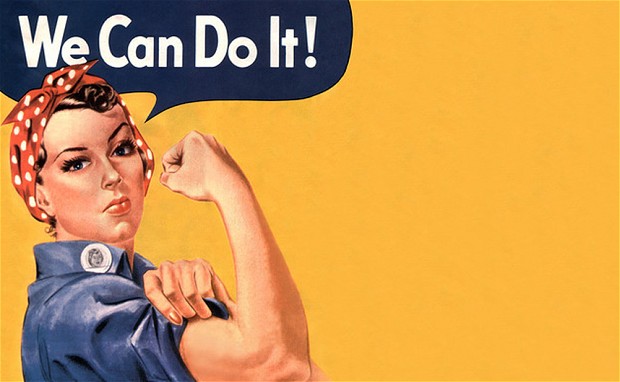The feminist movement first emerged in the 1960s, and has since evolved into number of waves. Collective movements, protests and public figures such as Jane Fonda and Gloria Steinem have all demonstrated the importance of feminism over the decades. Often understood as an umbrella of equality for all women, feminism has been promoted throughout Western culture as the answer to combating an unfair and omnipresent patriarchal system.
Pursuing equal political, cultural, economic and social rights for women, especially in the workforce and education system, has become an integral set of goals for countries such as the United States, Britain and Canada. Many public figures from these countries have addressed women’s rights in the international arena — most notably, former U.S First Lady and the much talked about potential 2016 Democratic Party Candidate, Hilary Rodham Clinton.
In her passionate address during the 1995 UN Conference on Women in Beijing, Mrs. Clinton proclaimed to the crowd that “women’s rights are human rights.” Given China’s human rights record at the time, the speech ignited much controversy and discussion around the world. Undoubtedly, Clinton’s well-known refusal to ever remain passive and voiceless is a big reason for the growing buzz surrounding her potential presidential candidacy.
Despite being a strong woman with high ambitions and acute intelligence, Clinton is more often criticised for her pantsuits and ill-fitting blazers than for her political capabilities. Feminist ideas, it would evidently seem, have yet to truly take root — even in the West. Still, society has made progress. Today’s political arena is home to both male and female leaders, the latter including prominent German Chancellor Angela Merkel and Brazilian President Dilma Rousseff.
Women have also made their mark in Hollywood. Just this year, superstar Beyoncé Knowles topped the Forbes’ 15th Annual Celebrity 100, with media mogul Oprah Winfrey and talk-show host Ellen DeGeneres respectively placing fourth and fifth. Only two men, NBA star Lebron James and rapper Dr. Dre, were even listed in the top five category, published on June 30.
In the business world, one can find Chairman (or ChairWOMAN), President and CEO of IBM, Ginni Rometty, listed by Fortune Magazine as the Most Powerful Woman of 2013. Right behind her is PepsiCo Chairman and CEO, Indra Nooyi. Both business women have successfully run multi-billion dollar corporations.
All of the above reveal the many cracks made from entirely different angles in a glass ceiling previously thought to be insurmountable.
However, today’s feminist forums also seem to be increasingly fixating on another issue entirely: the feminist lable. What exactly makes someone a feminist? Is there an objective list of criteria by which people could evaluate whether or not they deserve to call themselves feminists? The feminist movement is by no means undermining their other, much needed work on more concrete gender inequality issues (such as unequal pay or violence against women). However, some would argue that these have been placed on the back burner. Occupying the centre stage now is a conceptual battleground in which everyone wants to have the louder voice.
If a woman uses her natural sexual appeal, is she still a feminist? If a woman likes to wear makeup and do her hair — be it for herself or to please her partner — is she still a feminist? If a woman chooses to be domesticated and submissive to her partner, is she still a feminist? These questions, it appears, cannot be answered by the woman in question; feminism is no longer self-proclaimed. Instead, it is regulated by a society which feels obliged to scrutinise ideals and judge authenticity.
Particularly active in the above debate is an array of Hollywood celebrities. Last fall, 47 year old singer-song writer Sinead O’Connor wrote an open letter to 21 year old former Disney pop star Miley Cyrus. The latter had stated during an interview with Rolling Stone magazine that her music video Wrecking Ball was inspired by O’Connor’s music video, Nothing Compares. O’Connor responded to this mention by stating that Cyrus’s video was much more the result of her severe exploitation by men in the media world. The singer wrote to Cyrus,
“Yes, I’m suggesting you don’t care for yourself. That has to change. You ought be protected as a precious young lady by anyone in your employ and anyone around you, including you. This is a dangerous world. We don’t encourage our daughters to walk around naked in it because it makes them prey for animals and less than animals, a distressing majority of whom work in the music industry and its associated media.”
In her Wrecking Ball video, Cyrus is often shown naked and continuously licking a sledge-hammer. During her subsequently tour, the former Hannah Montana star was repeatedly called out for her provocative gestures and sexual references on stage. These accusations don’t seem to have affected the young star. On the contrary, Cyrus reacted to O’Connor’s letter in a biting tweet, insinuating that the Irish song-writer was mentally unstable. The fight became a social media phenomenon, with various celebrities and fans picking sides. “I feel like I’m one of the biggest feminists in the world” Cyrus would further state in an interview with BBC Radio 1’s Newsbeat, “because I tell women to not be scared of anything”.
Unlike Cyrus, 32-year-old international superstar, Beyonce Knowles was much more hesitant to define herself as a feminist when interviewed by British Vogue last April. The Texan native stated, “that word can be very extreme. But I guess I am a modern-day feminist. I do believe in equality”. Later that year, in December, the singer wrote a post for the Shirver Report called, “Gender Equality is a Myth!”.
Pop star Katy Perry, known for her vibrant top-40 hits, had similarly told Billboard magazine in 2012 that she did not consider herself a feminist. The American songstress stated, “I am not a feminist, but I do believe in the power of women”. However, Perry seemingly changed her mind this past March, welcoming the title of a feminist when prompted by an Australian reporter. The singer shared, “I used to not really understand what that word meant, and now that I do, it just means that I love myself as a female and I also love men”.
Hollywood’s cultural influence on Western society — and arguably, on the rest of the world — has continuously pressured many young adults, particularly young females, to conform to particular expectations. However, it has recently become the source of its own backlash movement, with female performers such as Cyrus proclaiming their freedom in new, controversial ways. Will women follow in her footsteps, or similarly to Perry and Knowles, be hesitant to adopt the feminist label? Should this title only be granted upon a certain level of maturity? To what extent can different interpretations coexist without undermining the feminist movement as a whole?




